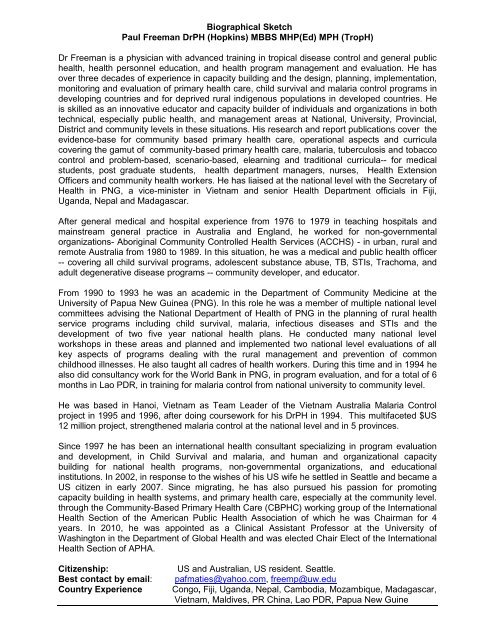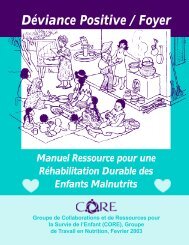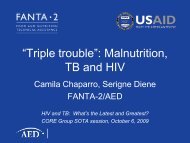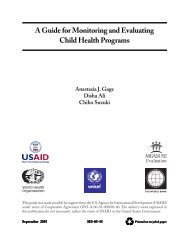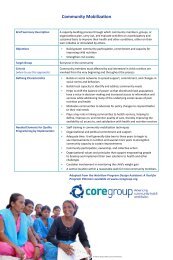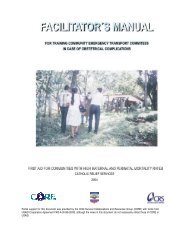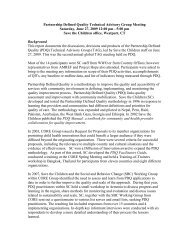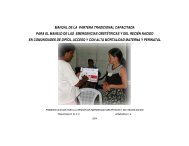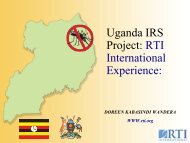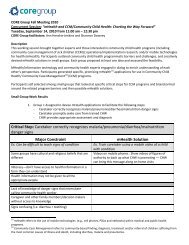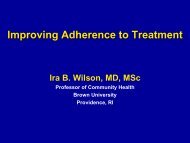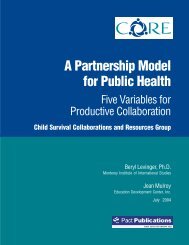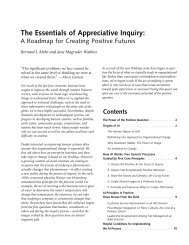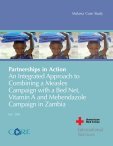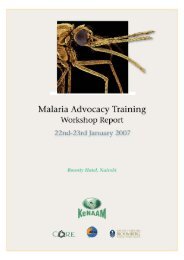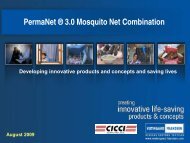Paul Freeman - CORE Group
Paul Freeman - CORE Group
Paul Freeman - CORE Group
Create successful ePaper yourself
Turn your PDF publications into a flip-book with our unique Google optimized e-Paper software.
Biographical Sketch<br />
<strong>Paul</strong> <strong>Freeman</strong> DrPH (Hopkins) MBBS MHP(Ed) MPH (TropH)<br />
Dr <strong>Freeman</strong> is a physician with advanced training in tropical disease control and general public<br />
health, health personnel education, and health program management and evaluation. He has<br />
over three decades of experience in capacity building and the design, planning, implementation,<br />
monitoring and evaluation of primary health care, child survival and malaria control programs in<br />
developing countries and for deprived rural indigenous populations in developed countries. He<br />
is skilled as an innovative educator and capacity builder of individuals and organizations in both<br />
technical, especially public health, and management areas at National, University, Provincial,<br />
District and community levels in these situations. His research and report publications cover the<br />
evidence-base for community based primary health care, operational aspects and curricula<br />
covering the gamut of community-based primary health care, malaria, tuberculosis and tobacco<br />
control and problem-based, scenario-based, elearning and traditional curricula-- for medical<br />
students, post graduate students, health department managers, nurses, Health Extension<br />
Officers and community health workers. He has liaised at the national level with the Secretary of<br />
Health in PNG, a vice-minister in Vietnam and senior Health Department officials in Fiji,<br />
Uganda, Nepal and Madagascar.<br />
After general medical and hospital experience from 1976 to 1979 in teaching hospitals and<br />
mainstream general practice in Australia and England, he worked for non-governmental<br />
organizations- Aboriginal Community Controlled Health Services (ACCHS) - in urban, rural and<br />
remote Australia from 1980 to 1989. In this situation, he was a medical and public health officer<br />
-- covering all child survival programs, adolescent substance abuse, TB, STIs, Trachoma, and<br />
adult degenerative disease programs -- community developer, and educator.<br />
From 1990 to 1993 he was an academic in the Department of Community Medicine at the<br />
University of Papua New Guinea (PNG). In this role he was a member of multiple national level<br />
committees advising the National Department of Health of PNG in the planning of rural health<br />
service programs including child survival, malaria, infectious diseases and STIs and the<br />
development of two five year national health plans. He conducted many national level<br />
workshops in these areas and planned and implemented two national level evaluations of all<br />
key aspects of programs dealing with the rural management and prevention of common<br />
childhood illnesses. He also taught all cadres of health workers. During this time and in 1994 he<br />
also did consultancy work for the World Bank in PNG, in program evaluation, and for a total of 6<br />
months in Lao PDR, in training for malaria control from national university to community level.<br />
He was based in Hanoi, Vietnam as Team Leader of the Vietnam Australia Malaria Control<br />
project in 1995 and 1996, after doing coursework for his DrPH in 1994. This multifaceted $US<br />
12 million project, strengthened malaria control at the national level and in 5 provinces.<br />
Since 1997 he has been an international health consultant specializing in program evaluation<br />
and development, in Child Survival and malaria, and human and organizational capacity<br />
building for national health programs, non-governmental organizations, and educational<br />
institutions. In 2002, in response to the wishes of his US wife he settled in Seattle and became a<br />
US citizen in early 2007. Since migrating, he has also pursued his passion for promoting<br />
capacity building in health systems, and primary health care, especially at the community level.<br />
through the Community-Based Primary Health Care (CBPHC) working group of the International<br />
Health Section of the American Public Health Association of which he was Chairman for 4<br />
years. In 2010, he was appointed as a Clinical Assistant Professor at the University of<br />
Washington in the Department of Global Health and was elected Chair Elect of the International<br />
Health Section of APHA.<br />
Citizenship:<br />
Best contact by email:<br />
Country Experience<br />
US and Australian, US resident. Seattle.<br />
pafmaties@yahoo.com, freemp@uw.edu<br />
Congo, Fiji, Uganda, Nepal, Cambodia, Mozambique, Madagascar,<br />
Vietnam, Maldives, PR China, Lao PDR, Papua New Guine
PAUL FREEMAN Curriculum Vitae<br />
EDUCATION:<br />
2003 Doctorate in Public Health Johns Hopkins University. USA<br />
1989 Master of Health Personnel - Education University of NSW, Sydney. Australia<br />
1986 Master of Public Health - Tropical Health University of Sydney<br />
1976 Bachelor of Medicine & Surgery University of NSW<br />
PROFESSIONAL EXPERIENCE<br />
June 2005 – ongoing. Co-Director, Task Force Reviewing the Effectiveness of<br />
Community-Based Primary Health Care in Improving Child Health. The Task Force has<br />
received financial support from UNICEF, WHO and the World Bank. We lead 60 reviewers<br />
working with the guidance of a multi-national expert committee led by Professor Robert Black.<br />
Progress of the Review was presented at the Global Health Council 2008. Brief prepared for<br />
USAID MCHIP published September 2011 (see details below under recent publications).<br />
Several technical papers presenting details of this review covering over 500 articles are under<br />
preparation for peer reviewed journal publication.<br />
November 10/2011 – February 2012 Member Strengthening Of Public Health Associations<br />
(SOPHA) Evaluation Team.<br />
The Republic of Congo was visited in November 2011 to meet with members of their Public<br />
Health Association and other relevant institutions at national and district level to assess the<br />
SOPHA program in that country. Subsequent report writing incorporated data from this and 5<br />
other countries receiving support under the SOPHA program to assess that program. This<br />
program was 25 years old and was being assessed towards renewal.<br />
April 2011 Review of “Where There is No Doctor” materials for Hesperian Foundation.<br />
Six chapters of the above materials were reviewed and updated for Hesperian towards<br />
publication of the latest written and electronic versions of this book. See<br />
www.hesperian.org/digital-commons.<br />
April 9 – May 3 2010. Team Leader of Fiji Health Sector Improvement Program<br />
Independent Completion Review. AusAID Funded.<br />
This successful 5 year AUD25 million national program aimed to strengthen the health sector<br />
under the military dictatorship in Fiji. Program activities broadly supported Fiji DOH programs in<br />
Immunization, Child Survival, Mental Health, Non Communicable Diseases, especially Diabetes,<br />
capacity building in Nursing, Primary Health Care program management and Health Promotion<br />
using the Healthy Settings Approach. A largely qualitative rapid assessment approach, including<br />
a participative workshop, was used. As requested by AusAID, in addition to the Review report, a<br />
short report was also prepared to guide phase out of the current program and to facilitate the<br />
design process for a smooth transition into a new program for the next 5 years.<br />
Recommendations covering key areas of the program were prepared in this regard. (Report<br />
available under Publications “Fiji Health Sector Independent Completion Report” at<br />
http://www.Ausaid.gov.au)<br />
2
March 1 2010. Appointed as Clinical Assistant Professor Department of Global Health<br />
MPH program, University of Washington.<br />
Feb 1 – March 10 2010. Team Leader of the End of Project Evaluation of the Capacity<br />
Project Uganda, USAID funded.<br />
This large generally successful 5 year project was implemented at the national level, in 11<br />
districts for many activities and throughout all districts for a few activities. It had multiple<br />
activities grouped under three components: Enhanced Capacity for HRH Policy and Planning;<br />
Strengthened Systems for Health Workforce Development and Improved Health Workforce<br />
Performance and Retention. A team of three Ugandan consultants was led to evaluate this<br />
project using a range of mainly qualitative methods. Multiple recommendations were made<br />
towards the extension of the project.<br />
June 14 – July 4 2009 Leader of the End of Project Evaluation of the Eastern Region<br />
Family Planning Project Nepal, funded by USAID implementation lead by ADRA<br />
International<br />
This innovative 5 year project strengthened Family Planning in 6 districts. Project components<br />
used an innovative approach to community mobilization, training of health professionals and<br />
community workers in 7 methods of Family Planning and activities to strengthen the quality of<br />
services provided and community participation. This project was planned using the Child<br />
Survival Sustainability Assessment (CSSA) framework.<br />
April 29 – May 18 2009 Strengthening of Proposal for Neglected Tropical Disease Control<br />
in Senegal. This proposal was for a consortium of NGOs bidding for a national control program<br />
in Senegal with an emphasis on Community Directed Interventions.<br />
November 17 – Dec 16 2008 Leader of the mid-term evaluation of the International Relief<br />
and Development Child Survival Project Cambodia. This successful four year project<br />
focuses on improving child nutritional outcomes through the use of innovative community based<br />
multi-level Behavioral Change Communication, the Hearth Approach and Appropriate<br />
Technology for water catchment, purification, local soap production and vegetable gardening.<br />
January 13 – Feb 11 2008 Consultant on design of new Child Survival Project in<br />
Madagascar for ADRA International An innovative project proposal was developed focusing<br />
on neonatal and maternal health and C-IMCI incorporating community based treatments.<br />
November 18 – Dec 1 2007 Consultant on redesign of community based Malaria Control<br />
Project in Mozambique for ADRA International<br />
This project is an inter-faith pilot project funded by USAID that required redevelopment as it was<br />
being considered for scale-up to the whole country. A redesign proposal was developed with the<br />
local stakeholders, local ADRA team and ADRA headquarters.<br />
Sept 2007- Leader of the final evaluation of the innovative Adventist Development Relief<br />
Association rural Child Survival Project, Madagascar, USAID funded<br />
This project was planned using the Child Survival Sustainability Assessment (CSSA)<br />
framework and Appreciative Inquiry approach to program planning. The project developed<br />
3
community level teams between local community workers and the local health facility chiefs;<br />
community health committees integrating community leaders with local health workers and<br />
health facility personnel; community level information reporting systems for illiterate traditional<br />
birth attendants; and local sustainability committees which formally planned the ongoing project<br />
activities they are to implement in the years after the project finished. A major achievement of<br />
the project was effective malaria control. Cluster surveys, LQAS, key informant interviews, focus<br />
groups, workshops and document review methodologies were all used or analyzed. Key<br />
recommendations made included taking all the innovations mention above to scale.<br />
July 2007- Consultant to UNICEF drafting State of the World’s Children 2008 annual report.<br />
Contributing author to three chapters of this report.<br />
July-August 2006 Leader of the final evaluation of the Adventist Development Relief<br />
Association rural Child Survival Project Cambodia. USAID funded.<br />
This project developed the Child Friendly Village Initiative, community health committees --<br />
integrating community leaders, village-based health volunteers and local health professionals --,<br />
a locally appropriate Hearth approach to management of child malnutrition, and innovations in<br />
training and monitoring. Cluster surveys, LQAS, key informant interviews, focus groups,<br />
workshops and document review methodologies were all used or analyzed. Key<br />
recommendations made included processes to build sustainable local learning organizations.<br />
November 2002 – 2007 Senior Lecturer (conjoint) School of Public Health & Community<br />
Medicine UNSW, Australia<br />
Lead author (of two) writing a textbook on the capacity building skills that public health<br />
consultants need -- in addition to their primary areas of expertise -- to work effectively in<br />
developing countries.<br />
Development of scenario-based e-learning materials for developing teaching of public health<br />
and management covering key public health practitioner competencies for Australian National<br />
Association of Public Health Institutions. From 1997-2006, taught and developed an annual<br />
internet-based postgraduate course Project Design and Monitoring in International Health. As<br />
this is an advanced course, key current components of common disease control programsmalaria,<br />
acute respiratory infection, TB, immunization, STIs (including HIV), and MCH are<br />
integrated into it. Course covered use of Logical Framework and SWAPs.<br />
June 1999 to Nov 2001 Educational Development & Tertiary Level Educator for Medical<br />
Officer Nursing Allied Health Personnel (MONAHP) AusAid project Papua New Guinea<br />
Developed and implemented a new five-year Problem Based Medical Curriculum. Taught<br />
applied Primary Health Services management to Master and Diploma of Community Health<br />
students at the Department of Public Health, University of Papua New Guinea (UPNG).<br />
Students were the leaders and managers of national, provincial and district health care<br />
programs in PNG and the South Pacific. Management courses facilitated, using a practical adult<br />
learning approach addressed such areas as managers as leaders, communicators and<br />
educators; quality assurance, health sector reform, health systems research, health program<br />
planning, implementation and evaluation. Parallel development of local academics and<br />
facilitation of institutional development of School of Health Sciences and UPNG Departments.<br />
4
July 1998 - April 99 Appraisal of essential Primary Health Care and standards for<br />
remote Aboriginal communities in the Northern Territory, Australia.<br />
Determined the essential Primary Health Care needs, services, standards, equipment and<br />
appropriate training to meet these needs; for remote Aboriginal Communities. Northern Territory<br />
Government funded.<br />
November 1998 Maldives Institute of Health Sciences Institutional Strengthening<br />
Assessed current Primary Health Care island services onsite and recommended revisions to<br />
PHC training and strengthening of the Institute in line with local health needs. AusAID funded.<br />
August 1997-Oct 1998 Human Resource Development & Tertiary Level Educator<br />
for MONAHP project Papua New Guinea<br />
Multiple terms of reference covered: identification of Specialist Medical Officer training needs;<br />
development of policies on continuing education and in-service training for Primary Health<br />
Services; multi-skilling and public health training needs for rural Primary Health Services. Also<br />
taught Primary Health Services management and mentored staff at UPNG.<br />
February 1997 – 98 Consultant in teaching health program management. Australia<br />
Developed and taught postgraduate courses for the University of NSW in Project Design and<br />
Monitoring in International Health and Evaluating Health and Education Programs.<br />
June 1997<br />
Strengthening County Health Program Management People's<br />
Republic of China World Bank health project, Beijing<br />
Facilitated workshops and developed corresponding manual which focussed on the<br />
development of a new approach to learning operational planning in the workplace.<br />
May 1995 – Oct. 96 Team Leader Vietnam-Australia Malaria Control Project<br />
Responsible for on-site negotiation, project planning, implementation and evaluation of this<br />
AusAID funded $US 12million, 5 province multi-faceted project. Seven Vietnamese, two full-time<br />
and eight visiting consultant staff were supervised. In this role he supervised the daily financial<br />
management of the project, managed large competitive tender procurement processes and<br />
small seed grants for village level community development projects, and negotiated extensive<br />
program revisions with Vietnamese counterparts. National level workshops were also led in the<br />
areas of Training of Trainers, Epidemiology and Antimalarial Drug Policy.<br />
June – August 1994 World Bank First Health Project<br />
& June – August 1992 Malaria Control Component Lao PDR<br />
In 1992, appraised malaria control and training needs at all level from University to community<br />
level. At this time malaria control facilities visited in rural areas were almost non-existent.<br />
Facilitated the development of a comprehensive plan, plus technical and management curricula,<br />
to train 4,000 personnel in multiple cadres. In 1994, led a national level project monitoring and<br />
planning workshop for 20 national and provincial managers from the 8 project provinces and a<br />
2-weeks long Training of Trainers workshop. Also developed a Primary Health Care curriculum<br />
for village level workers.<br />
1992 In-country consultant World Bank Special Interventions Project PNG<br />
Duties consisted of recommending an appropriate monitoring system to access the health<br />
effects of this short term project designed to relieve the acute effects of poverty.<br />
5
1991 - 1992 Rural PHC program evaluation Consultant to Child Survival<br />
Support Project John Snow International. USAID funded<br />
Designed and conducted a 4-province study of factors affecting health worker case<br />
management of common pediatric illnesses in rural health services in Papua New Guinea.<br />
1991 - 1992 Facilitator to WHO/UNFPA/ PNG Dept of Health Rapid<br />
Evaluation of MCH, Family Planning and Immunization Services<br />
Evaluated these programs in 10 provinces, through a 3 stage national level participatory<br />
process, involving the health personnel who deliver these services.<br />
1990 – 1993 Lecturer in Community Medicine, University of PNG, DOH Advisor<br />
Advised PNG National Department of Health on policy and programs: malaria control, child<br />
survival, FP, tobacco control, epidemic response/health information systems and two national<br />
health plans. Conducted multiple workshops in these areas for this Department at national and<br />
provincial levels. Teaching responsibilities included Health Systems Research, Epidemiology<br />
and Control and Primary Heath Care and Services – all programs (Malaria, TB, EPI, STIs, Child<br />
Survival) for medical students, Health Extension Officers (health program managers) and<br />
nurses. Field work, teaching medical students and district health service managers, took him to<br />
the squatter settlements of Port Moresby, and district and village levels in 10 out of the 19 PNG<br />
provinces. Conducted the national level training methodologies section of two USAID funded<br />
training-of-trainers workshops for SEATS and JHPIEGO.<br />
1984 - 1989 Area Medical & Public Health Officer Community Educator, Health<br />
Personnel Educator. Nganampa Health Council remote central Australia<br />
One of the founding facilitators of this health service in 1984. Developed, implemented and<br />
evaluated comprehensive primary health programs addressing Child Survival and maternal<br />
health, diabetes, ischaemic heart disease, Sexually Transmitted Infections, trachoma, TB,<br />
trauma and substance abuse (“Petrol Sniffing”). With the Health Workers, developed and<br />
implemented a problem-oriented, prevention-based, Health Worker curriculum for rural<br />
Aboriginal Health Workers. Conducted a program of training-of-trainers workshops for teachers<br />
of Aboriginal Health Workers. Developed and helped implement culturally-oriented, community<br />
education campaigns on AIDS for 11 semi-traditional Australian Aboriginal communities.<br />
Promoted the development of community organizations.<br />
Communication skills<br />
Communicated amicably with all levels of health personnel across cultures. These ranged from<br />
the Secretary of Health in Papua New Guinea and a Vice Minister of Health in Vietnam, the<br />
Directors of health institutes such as the Institute of Malaria Parasitology and Entomology in<br />
Vietnam and Lao PDR and Institute of Health Strengthening in the Maldives, to community level<br />
members and health workers in Cambodia, rural Papua New Guinea and indigenous Australia.<br />
Conducted training-of-trainer workshops focusing on development of skills in training,<br />
leadership, management and program evaluation for malaria control, family planning and<br />
primary health care programs in 5 cross-cultural setting. In Lao PDR and Vietnam all training<br />
sessions facilitated were led through translators.<br />
6
2011 Recent Professional Skill Development - Designing for Behavior Change<br />
October 17 to 21, 2011. Participant in Designing for Behavior Change Communication workshop<br />
Coregroup Washington DC<br />
Other relevant professional education of two weeks or more duration<br />
In 2003/4, I improved my skills in community development and conservation through distance<br />
learning and field visits in India with the Future Generations <strong>Group</strong> with emphasis on the SEED-<br />
SCALE approach. This approach encapsulated key aspects of community empowerment and<br />
action; and community level centres for local adaptation, experimentation and extension. I had<br />
previously been using these approaches in an applied manner at the community level in remote<br />
Australia and promoting them in Papua New Guinea.<br />
In 2004 I further strengthened my skills in facilitating workshops in Leadership<br />
Training/Building Learning Organizations for Health in developing countries using an<br />
approach that combines Senge’s principles of building learning organisations with Appreciative<br />
Inquiry principles. This was achieved through attending workshops led by Professor Henry<br />
Moseley and Ben Lozare from Johns Hopkins institutions.<br />
Gender and Development and Gender Analysis. Short Course IDSS Melbourne 2000.<br />
Program Monitoring and Evaluation- PRICOR approach. Course Medex group, Hawaii 1989.<br />
Other positions<br />
Assistant Editor Biomedical Journal Public Health Journal 2010 ongoing<br />
Professional association Memberships<br />
American Public Health Association, International Health Section<br />
Chair Elect International Health Section 2010- ongoing<br />
Chairman of CBPHC Working <strong>Group</strong> 2008 - 2011<br />
Co-chair of CBPHC Working <strong>Group</strong> 2003-7<br />
Chairman of Awards Committee 2007 - 2010<br />
Associate member Coregroup 2011-ongoing<br />
Member of<br />
Global Health Council 2002 ongoing<br />
Global Health Education Consortium 2009<br />
Public Health Association of Australia 1990 -2006<br />
Awards Received. $Aus80,000 Health Systems Development Grant from Commonwealth<br />
government for development of Community Health Worker training in 1988.<br />
Publications/Reports Over 50 covering areas of Community-Based Primary Health Care,<br />
Program and Project Evaluation in Child Survival, Family Planning and Human Resource<br />
Development, tobacco control, Primary Health Care, malaria program design, training,<br />
monitoring and evaluation; TB control; problem based and orientated training of all levels of<br />
health professionals - community health workers, trainers, medical students /practitioners and<br />
program managers.<br />
7
Most recent publication<br />
P.<strong>Freeman</strong>, H.B.Perry, S.K.Gupta, B.Rassekh<br />
Accelerating Progress in Achieving the Millennium Development Goal for Children through<br />
Community-Based Approaches Global Public Health Vol 7 No 4 April 2012 P 400-419.<br />
USAID MCHIP Building on the Current Evidence to Strengthen Community- Based Service<br />
Delivery Strategies for Promoting Child Survival 2011. (We prepared this brief for USAID)<br />
P.<strong>Freeman</strong> (ed) Report of CBPHC Working <strong>Group</strong> of the International Health Section APHA<br />
Annual workshop 2011 Community Health Workers What needs to be done to help these vital<br />
workers to be most effective and sustainable<br />
Current other relevant interests through Coregroup, APHA and DGH U.Washington<br />
Promoting addressing the needs of the urban poor-over 1.5 billion live in 3 rd world urban slums<br />
Promoting community organization strengthening as an essential part of CBPHC<br />
Promoting motivation of community members, CHWs, rural health professionals as per Pink’s<br />
book D H. Pink “Drive : The Surprising Truth About What Motivates Us” Riverhead Books<br />
Pubs Penguin <strong>Group</strong> New York 2009<br />
Member of FSN network, Social Behavior Change Working <strong>Group</strong> and subgroups Coregroup<br />
participating in continuing education and workshops.<br />
8


